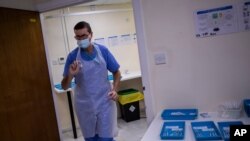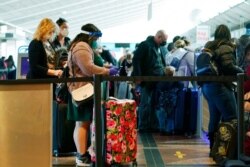The Pfizer-BioNTech COVID-19 vaccine neutralizes the rapidly spreading variant of the coronavirus recently discovered in Brazil, according to the results of a laboratory study.
Scientists with Pfizer and the University of Texas took blood from people who had been given the vaccine and mixed it with an engineered version of the mutation, dubbed P.1. The researchers found the vaccine was roughly as effective against the Brazilian variant as it was against other, less contagious versions of the virus from last year.
The results of the study were published Monday in the New England Journal of Medicine.
Russia vaccine deal
In another vaccine related development, Russia’s sovereign wealth fund RDIF has signed a deal with Swiss-based pharmaceutical company Adienne to mass produce Russia’s Sputnik V coronavirus vaccine for eventual use in Europe. The vaccine would be manufactured in Adienne’s production site in Milan, Italy under a deal reached Tuesday.
The European Union has warned member states against purchasing Russia’s COVID vaccine since the EU has not yet finished its review of Sputnik V. But the EU’s drug regulator, the European Medicines Agency, has come under growing criticism for its slow approval process of COVID-19 vaccine candidates, prompting some countries to unilaterally approve Sputnik V.
A peer-reviewed study published in The Lancet medical journal last month showed the two-dose Sputnik V vaccine is nearly 92% effective against symptomatic COVID-19.
US airline industry calls for new standards
As more and more coronavirus vaccines become available to the general public, the U.S. airline industry is urging the Biden administration to craft new standards for travel documents for travelers to prove they have been tested for, and vaccinated against, COVID-19.
In a letter sent Monday to Jeffrey Zients, the head of President Joe Biden’s COVID-19 coronavirus response team, more than 30 airlines, trade organizations and labor unions called on the Centers for Disease Control and Prevention to take the lead in developing the new standards they hope will eventually lead to the resumption of global travel.
Many nations and organizations are working to develop so-called “vaccine passports” for travelers to prove they have been vaccinated against COVID-19. But the World Health Organization says that such documents should not be used for international travel because coronavirus vaccines are not easily available globally.
Vaccine passports
WHO emergencies chief Dr. Michael Ryan told a press briefing on Monday there are “real practical and ethical considerations” for countries that are considering using vaccine passports and said the U.N. health agency advises against it for now.
The U.S. Centers for Disease Control and Prevention announced new guidelines Monday for those who have been fully vaccinated, advising that they can gather without masks in small groups with others who have been inoculated, but that they should still wear masks in public.







